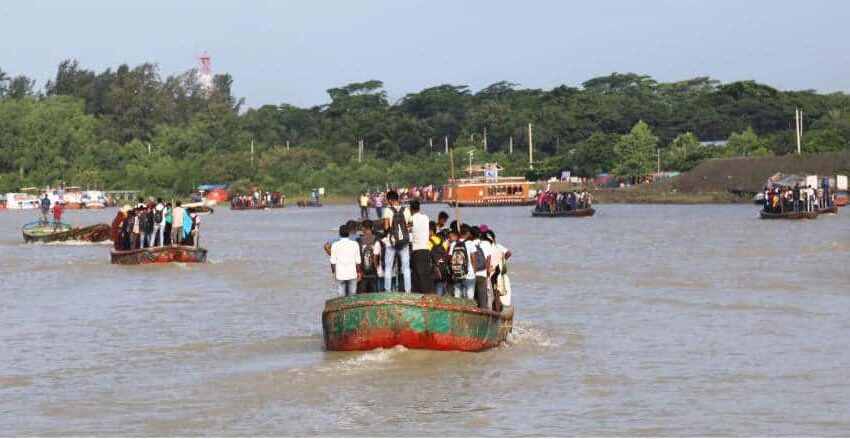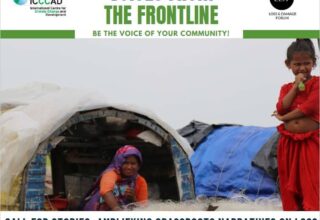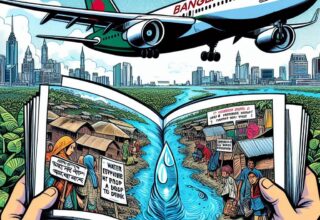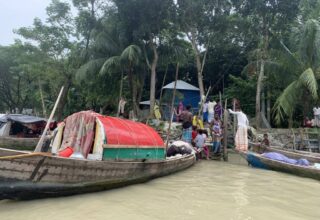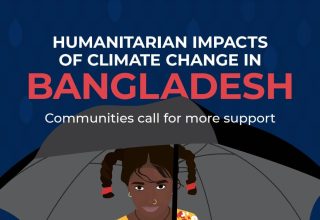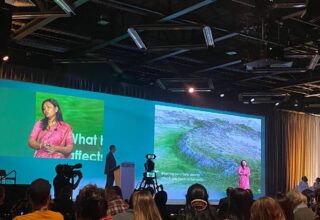Mongla in Bangladesh is facing adverse climate change impacts. What can we learn from the town’s efforts to minimise the impacts using its capacity and leadership?
The town of Mongla or Mongla Port Paurashava in Bangladesh is situated in the southernmost part of the country at the confluence of the Pashur River and the Bay of Bengal. The city is protected by Sundarbans, the world’s largest mangrove forest which was declared a UNESCO World Heritage Site in 1977. Large numbers of local and international tourists visit the Sundarbans mangrove forest every year.
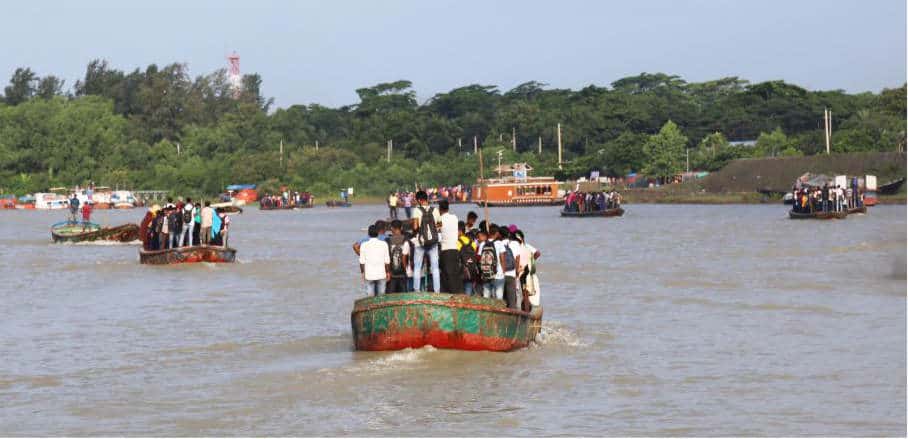
Mongla is home to Bangladesh’s second-largest seaport. At the beginning of 2009, Mongla Port underwent an extensive transformation to increase its capacity. Since then, the municipality has become a major economic contributor. Due to the increasing congestion in Chittagong, Bangladesh’s largest port, many international shipping companies turned to Mongla as an alternative. The port, Export Processing Zone (EPZ), fishing industry, and tourism are pivotal factors for the city’s economic growth. Over the past decade, the Mongla EPZ has experienced a remarkable 16-fold increase in exports. Recent developments – such as the construction of the multipurpose Padma Bridge that directly connects Mongla to the capital Dhaka and projects like the Rampal coal-based power plant evolving the industrial landscape – have strengthened economic ties further.
Economic and Population Growth
Mongla is also one of the most climate-vulnerable places in the coastal region near the Bay of Bengal. The city endures natural disasters such as cyclones and storm surges several times a year. Additionally, it struggles with salinity intrusion in soil, surface water and groundwater all year around. Even though the city faces multiple risks due to natural hazards, large numbers of migrants come to the small town, searching for livelihood opportunities or permanent settlements. The area of the town is 19.40 square kilometres and it had a population of 39,837 as per the census in 2011 (with a population density of 2,053 inhabitants per square kilometre). According to local data and information, the population has more than tripled in the past decade to about 150,000 people.
Pull factors for the population influx constitute the vast and diverse income opportunities, low living costs, low crime, fresh air, and no conflict with native people. Meanwhile, push factors include the aforementioned cyclones, storm surges, a drinking water crisis, and salinity intrusion.
Mongla’s Measures Against Natural Hazards
Different measures are taken to manage these natural hazards. To minimise the impacts of cyclones, the municipal authority uses loudspeakers to warn the residents of incoming storms. The anticipatory approach of Mongla’s early warning system is unique to the country and not common in other cities of Bangladesh. It covers the total area of the municipality of Mongla and helps the authorities reach the masses while also going door to door to warn citizens.
Less than a decade ago, Mongla was flooded twice a day with the rising tide, leaving the roads underwater. During storm surges, the town also flooded, making it difficult to move anywhere. To prevent flooding, the municipal authority constructed an 11-kilometre-long embankment to prevent water from entering the city. Along with the embankment, they constructed two sluice gates for flood control. That way some of the water can be used for agricultural purposes in the city.
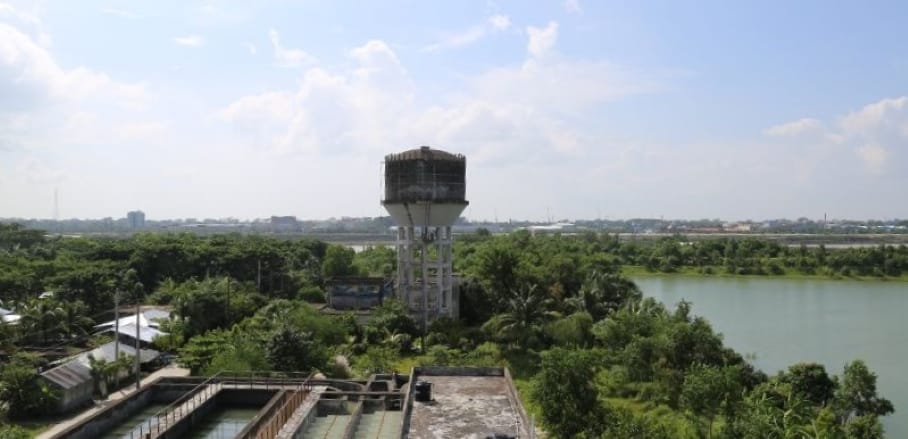
In the summertime, the city dwellers of Mongla are faced with increased heat stress in comparison to other areas in the country. To prevent residents from suffering from heat-related problems, the local authority planted trees beside the embankment and on the road dividers inside the town as a heat reduction strategy.
Moreover, salinity intrusion is a silent disaster in Mongla, contaminating and destroying cultivated areas such as gardens or agricultural land. However, the residents of the town can adapt to the situation, for instance, by receiving training from different organisations to educate themselves on how to grow vegetables and overcome salinity.
Building Resilience and Coping Strategies
Still, the most prominent problem in Mongla is the drinking water crisis. As everything is contaminated with saline there is no suitable groundwater in Mongla. The residents of the town completely depend on rainwater harvesting but irregular rain patterns and low precipitation exacerbate the lack of drinking water. To provide more access to water, municipal authorities excavated two large rainwater harvesting ponds, holding a total of around 100 acres. As a result, the water supply authority can provide around two million litres of drinking water per day to the city’s households.
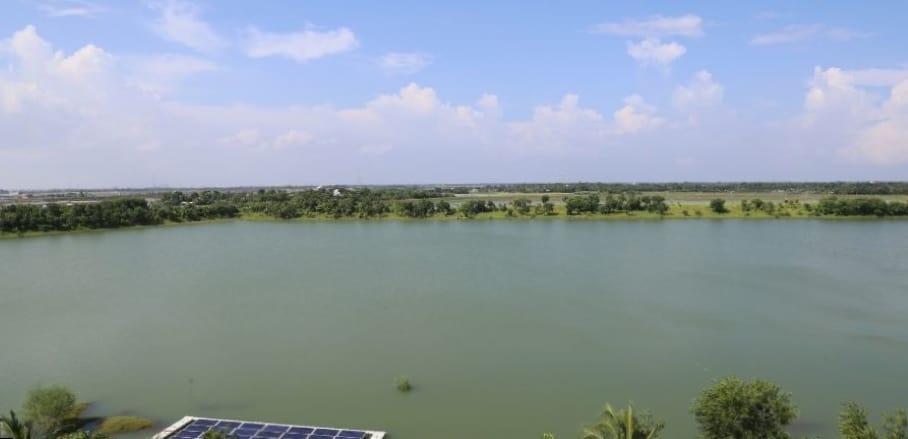
Even though Mongla is a small town and particularly vulnerable to the effects of climate change, it has a large population. The significance of the town is growing every day both economically and in questions of sustainability. The city has adapted different strategies to cope with the disasters that result from climate change. Despite being a developing country and the seventh most vulnerable country when it comes to suffering climate change impacts, Bangladesh and its municipalities have succeeded in creating solutions on how to tackle the adverse impacts of climate change. However, financial resources continue to be a big issue.
A Role Model for Upscaling in Other Cities
Climate change causes destruction everywhere, worsening hurricanes in the United States, and increasing floods in Canada and Western Europe. Even though these countries possess the financial resources and a stable infrastructure, they cannot escape the negative impacts of climate change.
Mongla, with limited financial resources, is building resilience and creating coping strategies to tackle climate change impacts even in the face of other issues such as informal settlements, increasing living costs and drinking water insecurity. There are practices here that we can learn from. However, we need to scale up these practices and build the capacity for other cities that encounter the same problem in other parts of the world. Together we can fight against climate change to minimise losses and damages and save our one liveable planet.
About the Authors:
Md. Lutfor Rahman is working as a research officer at the International Centre for Climate Change and Development (ICCCAD).

